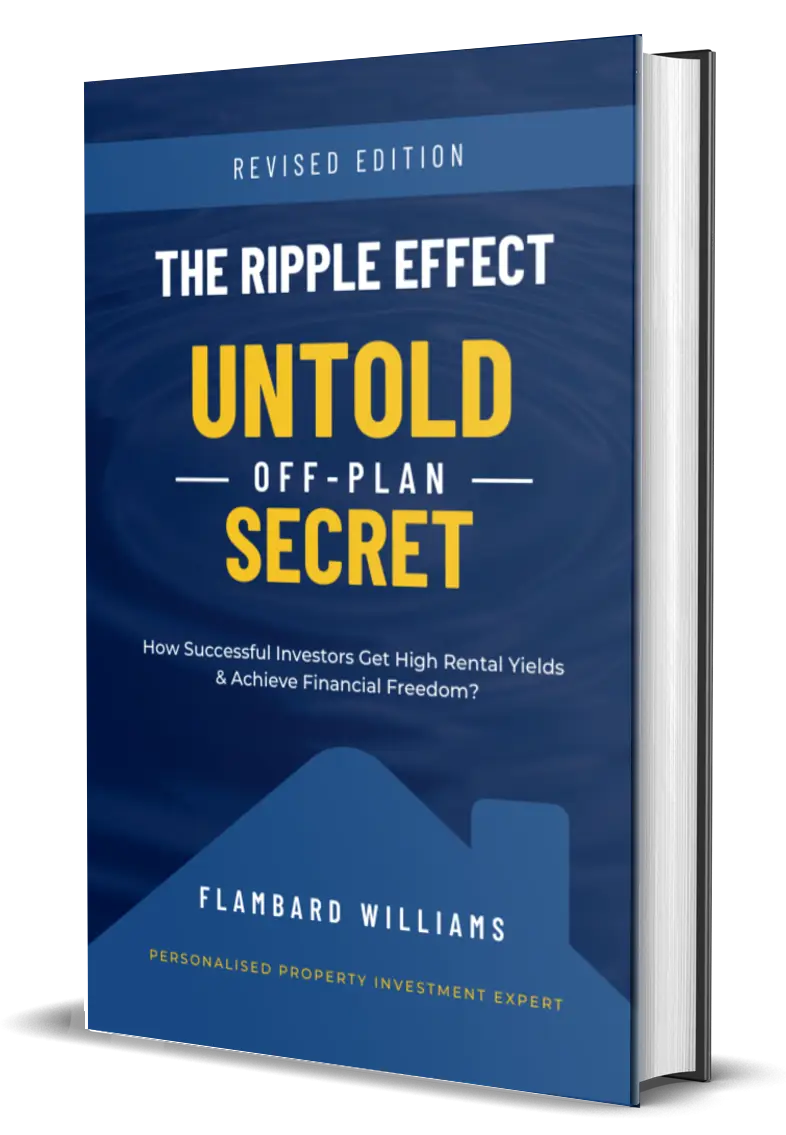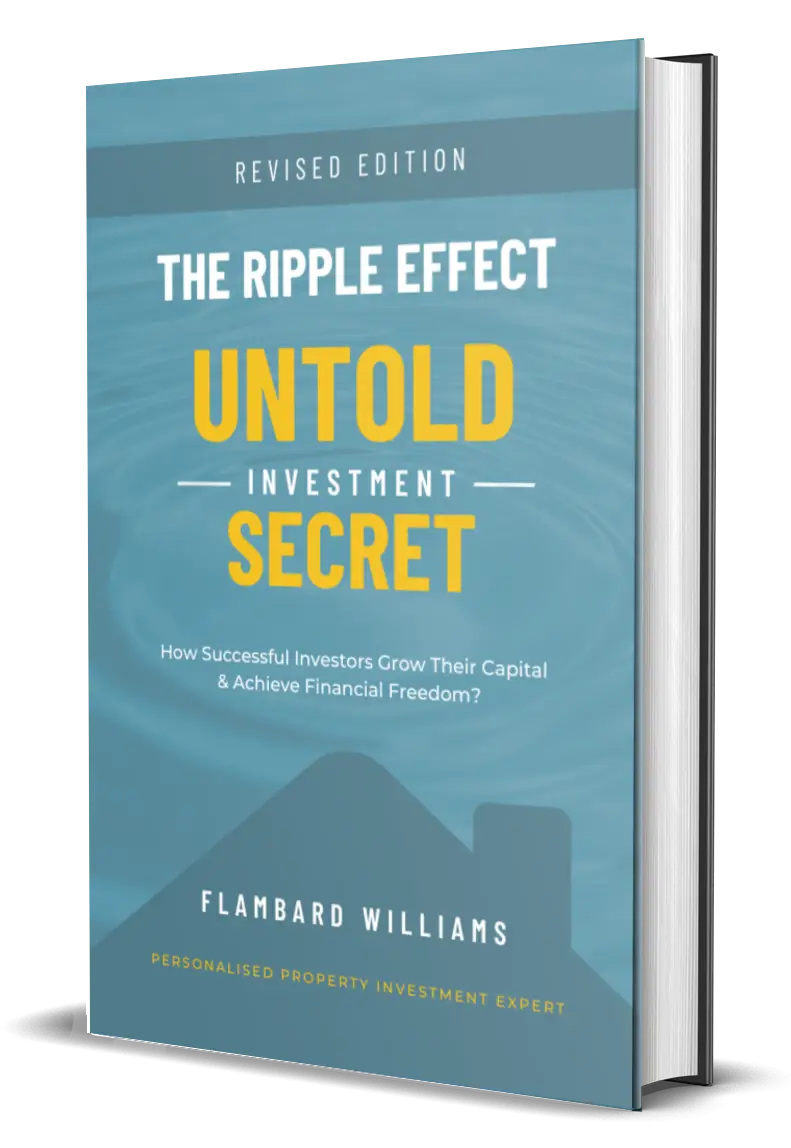Table of Contents
Table of ContentsToggle Table of ContentToggle
Manchester has truly cemented itself as one of the hottest property investment locations in the UK. While London was once the default choice, Manchester now stands out among UK cities for its dynamic economy, affordability, and excellent growth potential.
Investors are drawn to Manchester’s booming property market, which benefits from significant infrastructure investments, a growing student population, and major regeneration projects around areas like Salford Quays and the Northern Quarter.
The fact that Manchester’s property values have been going up really quickly over the last few years is even more exciting for investors. In fact, between 2020 and 2023, the average house price will rise by 25.8%.
Manchester’s economy is expected to keep growing, thanks in large part to its many job centres and the Northern Powerhouse plan. This means that there is a high chance that both rental prices and house prices will keep going up.
This city’s affordable housing prices relative to other UK cities and comparable cities mean property investors can expect stronger rental yields and steady growth in 2025, making it an ideal spot for buy-to-let investments and long-term capital growth.
The Current State of the Manchester Housing Market in 2024
It is November 2024, and Manchester’s housing market is still growing strongly, with prices going up all the time. A lot of people want to live in the city because it has a good job market, a lot of development projects, and better transport links.
The average house price in Manchester is approximately £248,000 as of August 2024, which remains significantly lower than London’s but still reflects solid growth. This difference in affordability, combined with Manchester’s lifestyle offerings and high rental yields, makes it a prime spot for both first-time investors and seasoned investors.
Demand for housing in Greater Manchester has outpaced supply, driven by a growing population, which has led to competitive prices across both the city centre and surrounding areas like Didsbury and Ancoats.
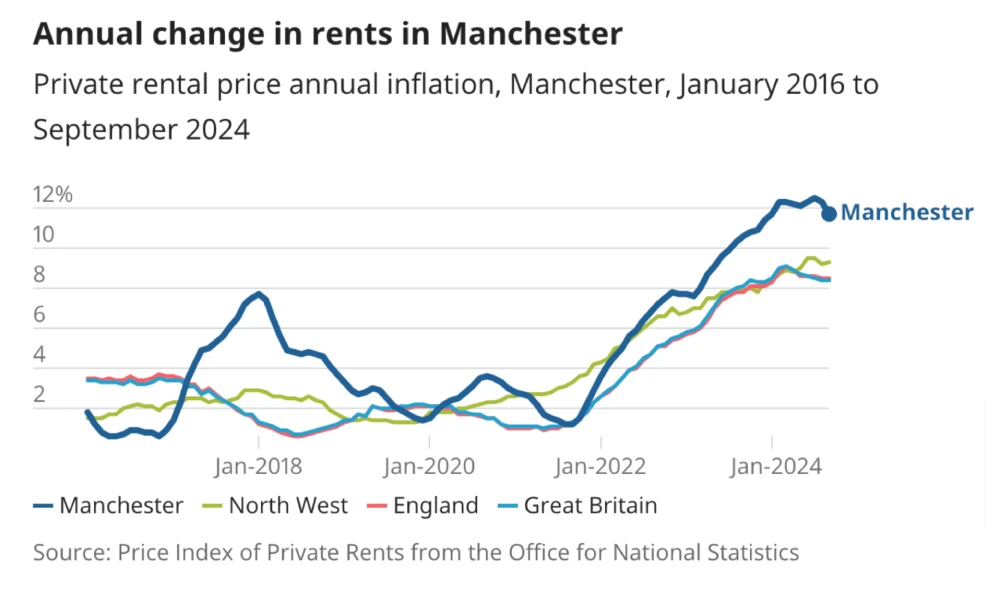
Source: Office for National Statistics
In fact, Manchester’s rental market has experienced an 8% increase in average rents over the past year, with rental yields averaging around 5-6% – a figure that remains highly attractive compared to other major UK cities.
Average House Price in Manchester, UK, 2024
According to ONS, the average house price in Manchester in August 2024 was about £248,000, suggesting that prices have been going up steadily over the past few years. And as property prices keep going up, Manchester has become a top choice for investors who want to make money through long-term capital growth and rental income.
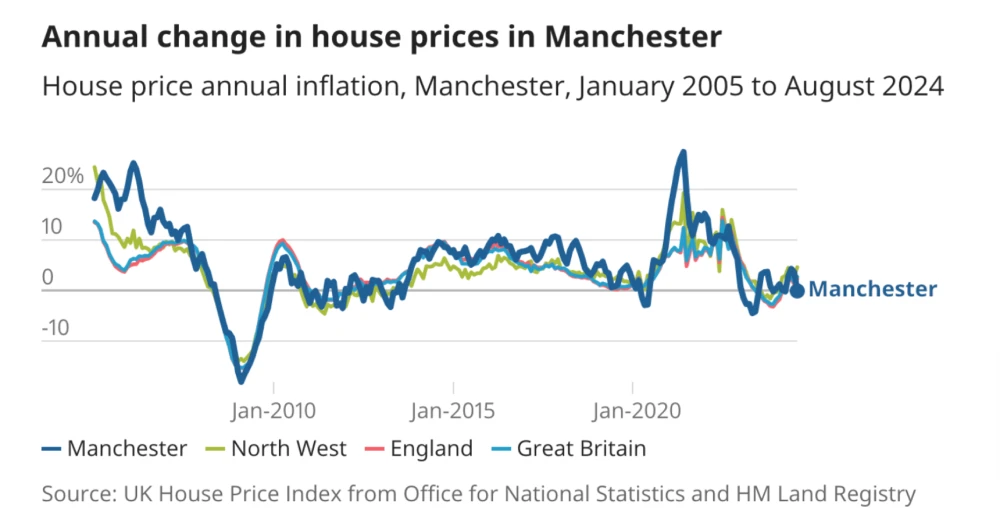
Source: Office for National Statistics
The city’s property prices have benefited from ongoing regeneration and infrastructure investments, including the development of transport links like the HS2 rail project for which the UK has spent £27 billion.
Compared to the national average, Manchester’s property values offer a much more affordable entry point, especially when you consider the investment potential across various neighbourhoods.
Key neighbourhoods like Salford Quays and the Northern Quarter are magnets for real estate investors because of their high demand from young professionals and continuous reconstruction projects, which are mostly to blame for the areas’ above-average price increases.
Recent Trends in Manchester House Prices
Manchester’s real estate market has been extremely strong over the past few years. Manchester’s strong job market, an increase in big businesses, and regeneration projects are some of the main reasons for its growth.
As a result of these changes, there are fewer homes available in the city centre. This is because more young professionals and students are looking for homes in Greater Manchester.
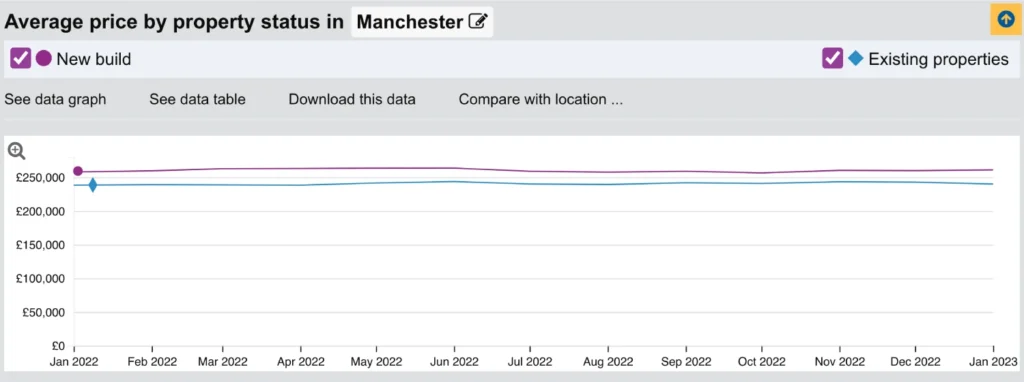
The rental market here is thriving, too, with yields staying high as demand for buy-to-let properties rises. The student population has a significant role in driving rental demand, and Manchester’s status as a cultural and creative hub draws renters looking for dynamic urban living.
According to the Land Registry, this demand is still strong. Prices are going up because there aren’t many homes for sale, especially in the city areas.
How the Prices of Homes in Manchester Compare to Other UK Cities in 2024
When we look at how housing prices have grown in Manchester compared to other UK towns, it’s easy to see why people like living there. Here, the average price of a home is merely £248,000. In London, the average price is above £500,000.

Source: Hometrack UK
Compared to other regional centres like Leeds or Birmingham, the Manchester real estate market provides a unique combination of affordability with noticeable price increases. It’s a city that lets investors tap into significant capital appreciation without the upfront cost seen in other major cities.
Greater Manchester’s property prices have even outpaced other northern cities, thanks to its expanding economy, major corporations setting up base here, and the city’s transformation through large-scale regeneration projects.
Real estate investors like Manchester because it’s cheaper than other big cities. Young workers and students looking for a lively, cheap city life are also drawn to Manchester. This is good news for people who want to get into Manchester’s real estate market because it means there is a high desire for rental properties.
Property Listing
- Manchester
Deposit
.
Yield
Property Price
.
- Manchester
Deposit
.
Yield
Property Price
.
Key Influences Shaping the Manchester Market Today
The real estate market in Manchester is growing in 2024. There are a lot of things in the city that make it a great place to invest in real estate. Regeneration projects are giving old, forgotten places a new lease on life.
Things in the economy, like interest rates and inflation, also have an effect on the market. There are also a lot of young workers who move to Manchester every year. Many of them choose it over towns with higher prices. Let’s take a closer look at what’s going on in Manchester’s market this year.
Regeneration Projects and Their Impact
In the last ten years, Manchester has gone through some amazing changes, and they are only getting faster. For example, the Victoria North project is a £4 billion investment that will build 15,000 new houses on 155 hectares north of the city over the next 20 years.
Then there’s the Mayfield project, a £1.5 billion redevelopment that’s turning a 24-acre area near the city centre into a vibrant mix of homes, offices, and leisure spaces. These projects aren’t just about creating buildings; they’re about creating communities.
Areas like Ancoats and Salford Quays, which once had little appeal, are now buzzing with activity, drawing in both renters and investors and pushing up property values.
Infrastructure Improvements and Transport Connectivity
It’s getting easier and easier to get around Manchester. The Metrolink tram network in the city has been growing to connect more areas. The HS2 rail project will make the trip from Manchester to London faster than ever.
These improvements make the city more attractive, especially for professionals who commute. Properties near these transport links are seeing a rise in demand and, naturally, a bump in property prices. For investors, that means there’s solid potential for capital appreciation, especially in areas close to these transport hubs.
Economic Influences: Interest Rates, Inflation, and Housing Demand
Interest rates and inflation have an effect on the Manchester real estate market, just like they do anywhere else. The cost of mortgages has increased due to rising interest rates. The demand for rental houses has surged as a result of many buyers remaining in the rental market.
Inflation has also driven up construction costs, adding to prices across the board. But even with these pressures, Manchester’s growing job market and resilient economy keep demand strong. Investors can see that Manchester’s rental market, in particular, is thriving, with both house prices and rental yields staying steady.
Growing Population and Skilled Workforce
Manchester’s population is growing quickly. Over the past ten years, it has grown by about 3% per year. A lot of these newcomers are young workers who are drawn to Manchester’s strong job market. More than 1.5 million workers live and work in the city. Many of them fit the local job market in high-demand industries including media, technology, and financial services.
Manchester’s colleges attract a sizable student body as well, many of whom wind up staying beyond graduation. Whether for purchase or rent, this consistent flow indicates a continuous desire for homes. This translates for investors into a consistent, expanding pool of tenants and consistent property value increase.
Top Areas for Property Investment in Manchester (2024)
Manchester has some fantastic neighbourhoods, each with its own character and investment appeal. Here’s a rundown of some of the best spots for property investment in 2024, with a look at what makes each area tick and some numbers on property prices and rental yields.
Manchester City Centre
Overview: The bustling heart of the city, is packed with business districts, high-end shops, and cultural hotspots.
Average Property Price: £300,000
Average Rental Yield: Around 5%
Everything happens in the city centre, which is why young professionals and college students who want to be in the middle of things love it there. Property prices are higher here—around £300,000 on average—but so is rental demand. Investors who can afford to get into this market enjoy consistent rental income and a high potential for capital appreciation, making it a solid choice for long-term investment.
Ancoats
Overview: A trendy neighbourhood that’s a mix of old and new, with industrial-era buildings alongside modern apartments.
Average Property Price: £275,000
Average Rental Yield: Around 5.5%
Ancoats has completely reinvented itself. What was once a run-down area is now a lively, artsy neighbourhood with coffee shops, eateries, and a strong sense of community. Renters love it here, especially young professionals who work in the city centre. With average prices around £275,000 and rental yields at about 5.5%, it’s a favourite for investors who want steady returns in a high-demand area.
Northern Quarter
Overview: Manchester’s indie and creative district, is famous for its art galleries, vintage shops, and music scene.
Average Property Price: £250,000
Average Rental Yield: Around 5.2%
Many young renters, creative types, and workers love the Northern Quarter because it has its own unique vibe. Price-wise, it’s a bit cheaper than the city heart, with homes running around £250,000. There is a steady demand for apartments in this area, which attracts investors. This makes it a great place to find long-term renters who are interested in culture.
Salford Quays and MediaCityUK
Overview: A waterfront hub that’s home to MediaCityUK, attracting digital and media professionals from across the country.
Average Property Price: £240,000
Average Rental Yield: Around 6%
The jobs in MediaCityUK and the digital sector make Salford Quays one of the best places in Greater Manchester to rent an apartment. The apartments on the water, the modern living spaces, and the ease of getting to fun things to do make this area very attractive. With prices around £240,000, Salford Quays is a top choice for investors looking for strong rental income and potential growth as the area keeps expanding.

Didsbury
Overview: A green, family-friendly suburb popular with professionals who want a quieter pace of life.
Average Property Price: £350,000
Average Rental Yield: Around 4.5%
Didsbury is one of those areas that just keeps its charm, with leafy streets, good schools, and a laid-back vibe. Property prices are higher here—around £350,000—but it’s a favourite for families and professionals looking for long-term rentals. For investors, Didsbury offers stable, steady returns and a tenant base that values the area’s community feel.
Hulme
Overview: Just south of the city centre, Hulme is affordable and on the rise, with lots of new development.
Average Property Price: £200,000
Average Rental Yield: Around 5.8%
Hulme has come a long way, with major regeneration projects making it a great option for first-time investors. The average price is around £200,000, and it’s popular with students and young professionals because it’s nearby to universities and the city centre. The rental returns are good here, which makes Hulme a good choice for people who want to get into the market for less money.
Fallowfield
Overview: A lively student area close to the University of Manchester, known for its high energy and strong rental demand.
Average Property Price: £220,000
Average Rental Yield: Around 6%
Fallowfield is often thought of as a place where students live, and the rental market reflects this. With property prices around £220,000 and rental yields at 6%, it’s ideal for buy-to-let investors focusing on the student sector. Demand is always high here, so if you’re looking for a solid rental income stream, Fallowfield is a great choice.
Chorlton
Overview: A friendly suburb with lots of green spaces, independent shops, and a lively food scene.
Average Property Price: £300,000
Average Rental Yield: Around 4.8%
Chorlton’s community vibe and mix of cafes, parks, and local charm make it a hit with families and young professionals alike. Chorlton’s popularity keeps demand consistent even if rental yields are a little lower than in some other regions. Chorlton is a consistent, sensible investment choice for those who are more concerned about long-term tenants and steady increases.

Initiate a powerful sequence of your property growth and reinvestment.

Initiate a powerful sequence of your property growth and reinvestment.
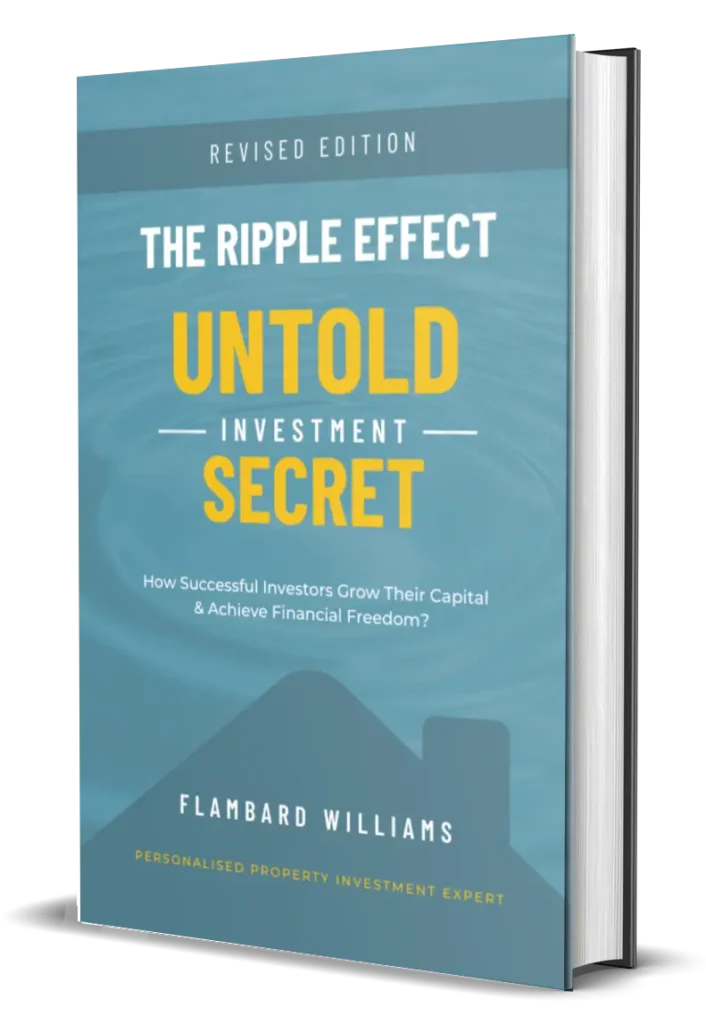
Unleash how successful investors build wealth, reduce financial stress, and achieve financial freedom.
Manchester’s buy-to-let market is thriving, and the stats speak for themselves. With rental yields averaging around 5.5%—well above the national average—this city has become a top spot for buy-to-let investors.
In popular areas like Salford Quays and Fallowfield, yields can even reach 6% or more, driven by constant demand from young professionals, students, and families. This is what makes Manchester unique—the city has a diverse rental market that spans everyone from recent grads and young professionals to long-term residents.
Demand for rentals in Manchester is high, especially in neighbourhoods close to public transport, universities, and employment hubs. With the city’s population rising at around 3% per year, there’s been no slowdown in demand for rental properties.
In fact, average rents in Manchester went up by roughly 8% last year due to that strong demand and limited supply. This means high occupancy rates, steady rental income, and the chance that yields will keep going up for investors.
People still want to live in places like Ancoats, the Northern Quarter, and Hulme which will bring in steady renting income and grow over time.
Manchester Real Estate Market Forecast for 2025 and Beyond
Manchester’s real estate market is expected to keep growing at least through 2025. Both house prices and rents are likely to go up. Population growth, a strong economy, and current revitalisation projects are all creating the conditions for a strong real estate market. Let’s look more closely at what the real estate market in Manchester might be like in 2025 and the years to come.
Manchester Property Price Forecast 2025
Based on the UK house price index, property prices are likely to rise even more in 2025. The Manchester property price forecast talks about a 6-7% rise in prices for the year. This is in line with steady growth over the last few years.
Between 2020 and 2023, Manchester home prices will rise by about 25.8%. House prices have gone up because there aren’t many homes for sale, there’s a lot of demand, and big projects are changing neighbourhoods like Victoria North and Mayfield.
Ancoats and the Northern Quarter, which are close to the city centre, are likely to see the most growth because they are in high demand among young workers and offer a good mix of character and convenience.
Investors who want their money to grow are looking at these high-demand places. New buildings and better transport are driving up property values even more quickly.
Manchester Supply and Demand in 2025
Manchester’s real estate market has long been defined by a supply-demand imbalance, and 2025 will likely see more of the same. While regeneration projects like the £4 billion Victoria North initiative are adding much-needed housing to the city, demand still outweighs supply.
The city’s steady population growth, particularly from young professionals and students, keeps demand high for both rental properties and homes for sale.
This means that places near the city centre, such as Salford Quays and Hulme, will remain rather competitive given their strong occupancy rates and rental returns. Given their great demand, rents and prices are probably going to rise continuously.
For those who wish to generate consistent returns, this is favourable. As long as demand remains high and supply is limited, buy-to-let and new-build investors will find the Manchester real estate market rewarding.
Manchester Economic Prediction for 2025
Thanks to big sectors like software, finance, and media still growing, Manchester’s economy is predicted to remain robust in 2025.
The city’s role in the Northern Powerhouse project—a government-backed plan to boost the economy in northern England—has attracted both businesses and new residents. With job opportunities increasing, more professionals are moving to Manchester, driving demand for housing even further.
Predictions suggest that interest rates will stabilise in 2025, which could ease mortgage costs and make it easier for more people to buy, potentially boosting the real estate market even further.
For investors, the city’s economic growth stability and high demand for rental properties provide a good platform for property investment. Manchester is a top choice for buy-to-let investors looking for consistent income and long-term gain due to its high rental yields, capital growth prospects, and strong economy.

Main Developments Driving Growth in Manchester (2025)
Manchester is a city that is always changing. In 2025, even more changes will happen thanks to new projects, strategic attempts to revitalise the city, and cultural attractions that continue to attract renters.
These changes are changing the Manchester real estate market by making new places where investors want to put their money and making the city more appealing generally.
Key Projects and Infrastructure Development
A lot of big infrastructure projects are planned for Manchester. These will improve connections and make the city even more appealing to both locals and investors. There are a lot of important projects going on right now that will make it faster than ever to get from Manchester to other big towns in the UK.
When it’s finished, HS2 will cut the travel time between Manchester and London to just over an hour. This will make the city easier for commuters to get to and increase demand for homes in places with good transport.
The expanded Metrolink tram network is also transforming Greater Manchester, connecting previously isolated neighbourhoods and making commuting within the city more efficient.
The prices of houses should go up because of these projects, especially in places close to transport hubs. For investors, places like Piccadilly and Salford Quays are good places to look into because better access to places often drives up property prices.
Regeneration and Incoming Investment in 2025
Manchester has always been a city that is willing to adapt, and its most recent projects to improve the city are some of the biggest and best yet. The £4 billion Victoria North development is one of the biggest regeneration efforts underway, set to create 15,000 new homes over the next couple of decades on 155 hectares north of the city.
This project isn’t just about housing—it’s about creating communities, with plans for green spaces and mixed-use developments to create a real neighbourhood feel.
The Mayfield project, a £1.5 billion regeneration effort near the city centre, is another key driver, turning a former industrial area into a vibrant mix of residential, commercial, and leisure spaces.
This area, once overlooked, is quickly becoming one of Manchester’s most desirable spots, thanks to its proximity to transport and the city centre. For investors, regeneration projects like these not only increase real estate values but also attract a wide range of renters, from young professionals to students.
Cultural Appeal and Tenant Demand
One of the best things about Manchester for both locals and tourists is its cultural scene. Manchester is popular with tenants who want to live in a city that is both lively and affordable.
It is known for its art galleries, thriving food scene, and long history of music. Places like the Northern Quarter, which has lots of independent shops, cafes, and creative arts venues, have become culture hotspots that make people want to rent.
The city’s growing reputation as a tech and digital hub is also bringing in young, skilled workers, further boosting tenant demand. Manchester has one of the UK’s largest student populations, with over 100,000 students across several universities.
Many of these students stay in Manchester after graduation, contributing to a high demand for rental properties, particularly in areas close to the city centre. Manchester’s strong cultural appeal and diversified tenant pool result in consistent demand and high occupancy rates, making it an ideal market for buy-to-let investments.


Angel Gardens is located in an up-and-coming district of Liverpool. It is in close proximity to two major regeneration projects: the £150 million Project Jennifer and the £5.1 billion Liverpool Waters scheme.
Cash Needed
Rent per month

Limited Units


£185k
Long-Term UK and Manchester Property Market Predictions (2024 to 2027)
Looking ahead, the UK housing market is expected to rise steadily, with Manchester standing out as one of the locations most likely to experience considerable gains. Thanks in part to population growth, economic resilience, and ongoing housing demand, Manchester is among the top performers in long-term property investment projections.
House Price Forecasts for the United Kingdom Over the Next Five Years
With a projected average yearly growth rate of 3–5%, UK house prices are expected to climb progressively over the next five years. While economic factors such as interest rates and inflation may slow growth in some areas, cities with strong job markets and housing demand—like Manchester—are likely to outperform the national average.
By 2027, UK housing prices could see a cumulative increase of 15-20%, with Manchester potentially exceeding this due to its high demand and ongoing development.
Manchester’s economy is also a big part of the picture, supported by the Northern Powerhouse initiative, which continues to draw new businesses and professionals to the city.
This economic activity supports a solid housing market, and for investors, it means there’s good reason to expect Manchester property values to outpace other regions, especially in areas benefiting from new infrastructure and regeneration.
Buy-to-let Market in the UK
The buy-to-let market is still robust in the UK, and Manchester stands out for rental yields. Although typical rental yields for buy-to-let properties in the UK range from 4-5%, Manchester regularly beats this with yields averaging approximately 5.5%.
In some places, such as Salford Quays and Fallowfield, returns can reach 6%). Manchester’s rental market shows no slowing down given a large student population, flood of young professionals, and families seeking reasonably priced city living.
Compared to other cities in the UK, Manchester property prices are relatively affordable, making it a great option for investors looking for both rental income and future capital growth.
The rising mortgage costs and house prices across the UK have led more people to rent, boosting the rental market. With continued annual house price growth, solid rental yields, and a big pool of tenants, Manchester’s buy-to-let market offers a promising outlook for the next five years and beyond.
Conclusion
Manchester’s real estate market is one of the best in the UK because it has chance, growth, and low prices. It keeps getting investors, young workers, and students because it has a strong economy, arts and culture scenes that are alive and well, and renovation projects that are moving forward.
Forecasts suggest steady growth through 2025 and beyond, with rental demand and property values on an upward trend due to the city’s ongoing transformation and investment appeal.
For investors seeking long-term capital appreciation, high rental yields, and a resilient market, Manchester provides an ideal landscape, making it a top choice for buy-to-let and property investments in the UK.

Area Guide
Tom Collins
I’m your go-to broker, on a mission to make things simple and smooth when making your investment with me! My journey at Flambard Williams has been shaped by working in various financial fields and working closely with clients and their goals.


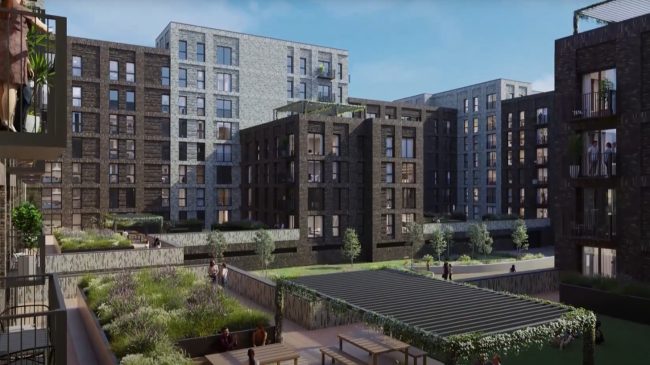







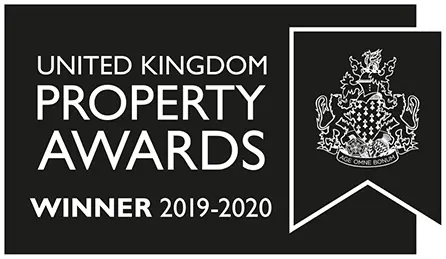
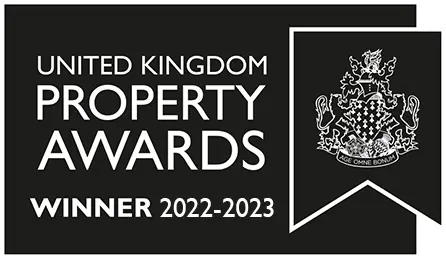
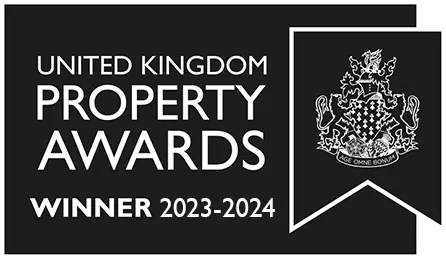





 Exclusive Property Launch Invitations
Exclusive Property Launch Invitations Customised Market Reports
Customised Market Reports Exclusive Access to Off-Market Properties
Exclusive Access to Off-Market Properties Networking Events
Networking Events